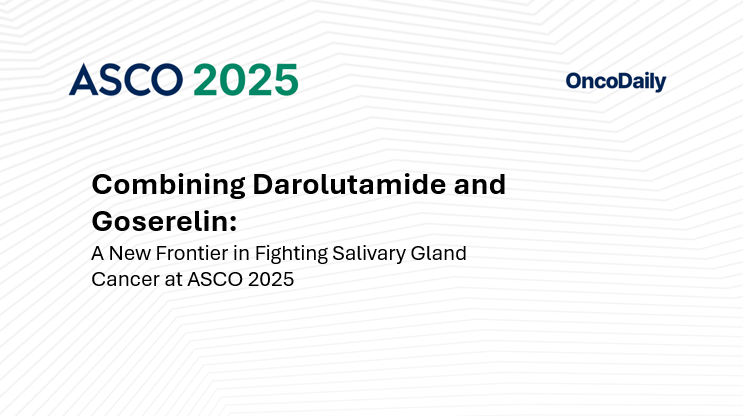What is the Clinical Problem Addressed by this Study?
Salivary gland cancer (SGC) unresectable locally advanced (LA) or recurrent/metastatic (R/M) currently lacks a standard treatment. Previous findings suggest combined androgen blockade (CAB) may benefit patients with androgen receptor (AR)-positive SGC, but no AR-targeted drugs are approved yet.

How was the Study Designed and who were the Patients?
This multicenter phase 2 study enrolled patients with AR-positive LA or R/M SGC, ECOG performance status 0–2, and no local therapy options. Patients received darolutamide 1,200 mg daily plus goserelin 3.6 mg every four weeks. The primary endpoint was objective response rate (ORR) by independent central review (ICR).
What were the Key Efficacy Outcomes?
Among 33 patients enrolled:
- ORR was 45.2% (14/31; 95% CI, 27.3–64.0), meeting the primary endpoint.
- Clinical benefit rate (CBR) was 51.6%.
- Disease control rate (DCR) was 64.5%.
- Median progression-free survival (PFS) was 13.1 months.
- Median overall survival (OS) was not reached; 12-month OS rate was 87%.
What Safety Results were Observed?
Treatment was generally well tolerated. Grade 3 adverse events occurred in 18.2% of patients, with no unexpected safety signals.
What Conclusions Can be Drawn from the Study?
Darolutamide combined with goserelin demonstrated meaningful clinical efficacy and a favorable safety profile in AR-positive unresectable LA or R/M SGC, suggesting a promising treatment option before chemotherapy.
Authors:
Susumu Okano, Makoto Tahara, Kiyoaki Tsukahara, Tomoyuki Otsuka, Satoshi Kano, Masato Nagaoka, Hideoki Uryu, Daisuke Sano, Naoki Nishio, Akira Ohkoshi, Kazuchika Ono, Toyoyuki Hanazawa, Satoru Shinoda, Yuriko Takeda, Kouji Yamamoto, Naomi Kiyota
Organizations:
Department of Head and Neck Medical Oncology, National Cancer Center Hospital East, Kashiwa, Japan; National Cancer Center Hospital East, Kashiwa, Japan; Tokyo Medical University, Shinjyuku, Tokyo, Japan; Osaka International Cancer Institute, Osaka, Japan; Hokkaido University Hospital, Sapporo, Japan; Jikei University Hospital, Minato, Tokyo, Japan; National Hospital Organization Kyushu Medical Center, Fukuoka, Japan; Yokohama City University Hospital, Yokohama, Kanagawa, Japan; Nagoya University Hospital, Nagoya, Aichi, Japan; Tohoku University Hospital, Sendai-Shi, Miyagi, Japan; Institute of Science Tokyo Hospital, Bunkyo, Tokyo, Japan; Chiba University Hospital, Chiba, Japan; Yokohama City University, Yokohama, Japan; Kobe University Hospital, Kobe, Hyogo, Japan
How Common is Salivary Gland Cancer?
According to data presented at ASCO, approximately 31,189 patients have been diagnosed with salivary gland cancers in analyzed datasets. These cancers encompass several histological subtypes, including mucoepidermoid carcinoma, adenoid cystic carcinoma, acinic cell carcinoma, and adenocarcinoma, which together represent a significant portion of cases. Mortality rates for salivary gland tumors have worsened between 2000 and 2014 across both geriatric and non-geriatric populations, with notable disparities observed between racial groups such as Caucasians and African Americans.
The overall five-year survival rate for salivary gland cancer is approximately 75-76%, according to ASCO and MD Anderson Cancer Center data. Survival rates vary significantly depending on the stage at diagnosis. For localized salivary gland cancer, where the tumor has not spread outside the gland, the five-year relative survival rate is about 94-95%. When the cancer has spread regionally to nearby structures or lymph nodes, the five-year survival rate drops to around 70%. For distant metastases, where the cancer has spread to other parts of the body such as the lungs, the five-year survival rate is approximately 43%.
Overall, salivary gland cancers remain a challenging group of diseases due to their rarity and diversity. The observed increase in mortality rates underscores the urgent need for improved therapeutic options and earlier diagnosis. Molecular characterization is becoming an essential tool in guiding treatment decisions and developing novel targeted therapies.
You Can Also Watch Tony Hung on GPT-4’s Role in Clinical Trial Recommendations for Head and Neck Cancer | ASCO 2024 by Oncodaily
Written by Aharon Tsaturyan MD


